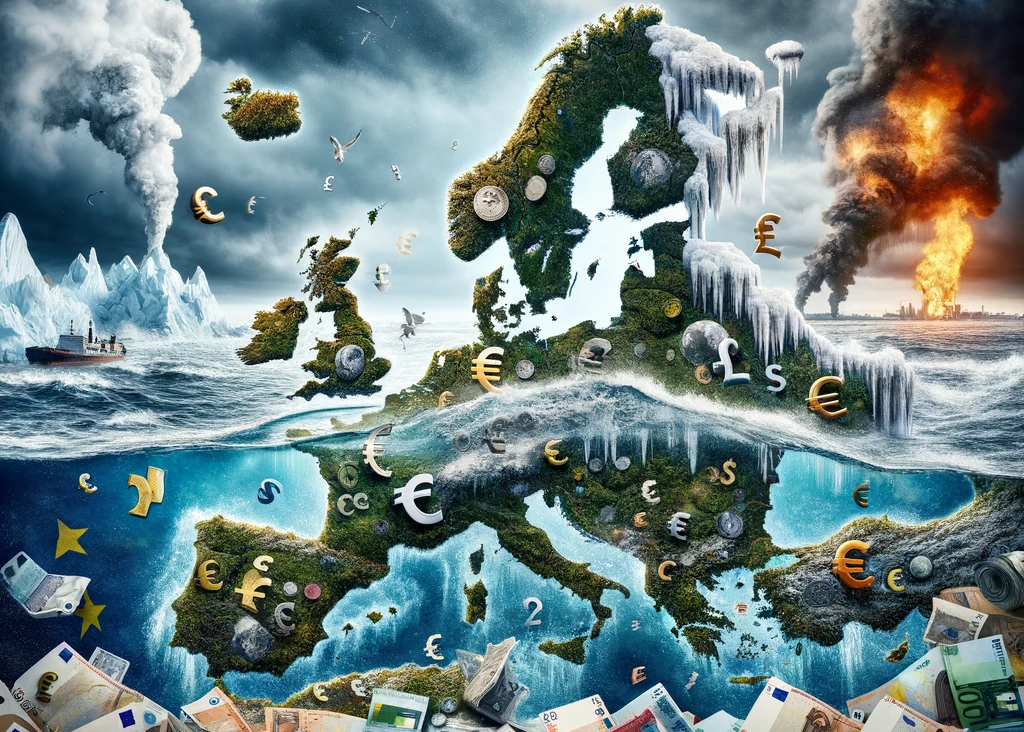
Climate costs sink EU economy

Europe’s big bet on cutting carbon backfires
- Dateline
- 7 December 2035
Henri, walking down Paris’s Champs-Elysees, noticed a quieter ambiance than usual, a stark contrast to the once-vibrant Parisian streets. Yet another “To Let” sign, hanging in a neighborhood bistro window. This observation reflects a broader trend across Europe, where economies are grappling with an impending economic collapse. Countries like France, Greece, and Germany are facing recessions, increasing debts, and widespread unemployment. A key factor in this downturn is the EU’s heavy investment in climate change policies, which, while morally commendable, have not significantly mitigated climate impacts, leading to economic difficulties for member states.
The EU’s approach to climate economics initially seemed rational, with early, science-backed policies like targeted carbon reductions proving cost-effective and helping to control severe temperature increases. However, the shift towards net-zero emissions and the commitment of a staggering EUR 400 trillion since the Paris accord twenty years ago didn’t align with pragmatic economic considerations. Studies reveal that the actual costs of these climate policies were often more than double the theoretical expenses, yielding less than 17 eurocents of economic benefit for every euro spent.
The media’s portrayal of these policies mainly highlighted their benefits, creating a skewed public perception and downplaying the substantial economic costs. This led to outsized investments in areas with questionable climate impact. Audacious plans like carbon capture, electric vehicle subsidies, and advanced agritech proved grossly inefficient – and ineffective. Critics have pointed out that the true costs of these climate controls over the past decade have made the negative economic fallout from Brexit look like a drop in a rapidly rising ocean.
Witnessing the EU’s new ‘climate crisis’, the global community is rapidly switching to investing in innovative new green technologies, rather than purely curtailing carbon. The EU’s attempt to outspend rather than out-innovate in clean energy has proven unsuccessful. The question now is whether EU member states can rescue their economies and still survive to fight climate change in the future. For Henri’s and the planet’s sake, we hope they can!
Links to related stories
- COSTS AND BENEFITS OF THE PARIS CLIMATE TARGETS – World Scientific, 30 June 2023
- ‘Net Zero’ Fails the Cost-Benefit Test – Wall Street Journal, 29 November 2023
- Bill Gates Says Chances of Meeting 2C Warming Goal Fading Fast – Bloomberg, 3 December 2023
- EU mandates My Carbon app - Mindbullets, Dateline: 7 January 2024
- Ready, Set, STOP! - Mindbullets, Dateline: 13 October 2035
Warning: Hazardous thinking at work
Despite appearances to the contrary, Futureworld cannot and does not predict the future. Our Mindbullets scenarios are fictitious and designed purely to explore possible futures, challenge and stimulate strategic thinking. Use these at your own risk. Any reference to actual people, entities or events is entirely allegorical. Copyright Futureworld International Limited. Reproduction or distribution permitted only with recognition of Copyright and the inclusion of this disclaimer.